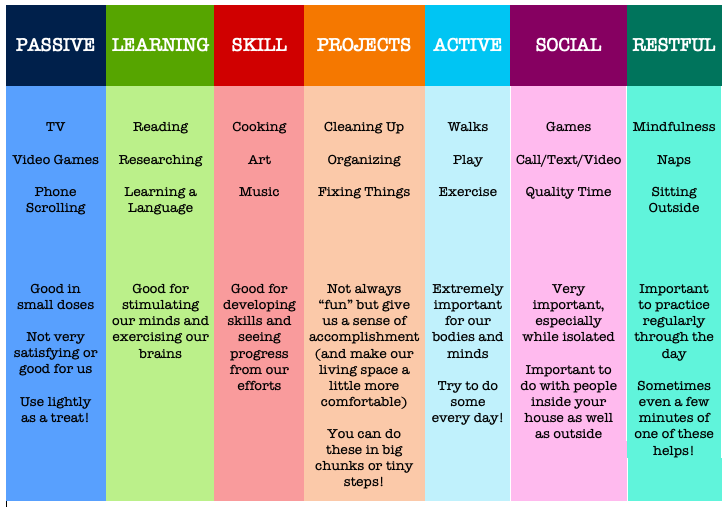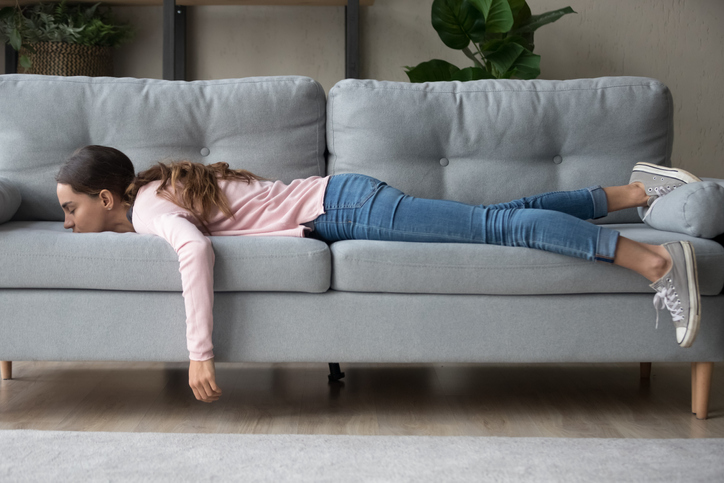Coronavirus is still around. Most of us went indoors in March thinking that it would be a few weeks of social distancing and isolation, and we would be back out into the world. Now, it’s looking more like we have weeks or even months ahead of us. In looking at that, it’s time to start making plans for how you will spend your time at home.
It’s important to remember that we, as humans, need things to do. We need to feel active, productive, and engaged. While “doing nothing” often seems appealing, it is enjoyable in small doses. In large doses, having nothing to do leaves us with too much time with our thoughts, feeling ineffective, feeling bored, and often feeling anxious and depressed.
It’s also important to have a mix of activities and ways to spend your time. Here’s one way to think about it:
Passive Activities
These are activities that are fun and enjoyable, but take minimal effort and energy. This would include things like watching TV, playing video games, or scrolling on your phone. These are activities that often bring feelings of enjoyment and comfort; however, they rarely bring much satisfaction. They are best in small doses, and can leave us feeling worse (and feeling like we lost our time) when overused.
Learning Activities:
These are activities that use a lot of our brain-power. This would include things like reading, learning a new language, researching a new topic, or doing brain puzzles (like crossword puzzles). These activities are mentally engaging and good for our minds, but can be tiring or overwhelming, and too much of them can feel like work.
Skill Activities:
These are activities that help us learn or practice a new skill. This would include playing an instrument, cooking and baking, woodworking, and making art. These activities help to give us a challenge, and continue to develop a skill that is important or meaningful to us. These activities are also a good way to feel a sense of progress as we continue to improve.
Accomplishing Projects:
These are activities that are maybe less traditionally “fun,” but which are often very important for feeling accomplished. This would include cleaning out closets, doing chores around the house, or fixing problem areas or things that are broken. These are often the kinds of projects that hang over our heads. On the one hand, this means that it can be hard to convince ourselves to get moving on them; on the other hand, this means that there is often a major pay-off to completing them.
Active Activities:
These are activities that get our bodies moving. This would include going on walks, playing with kids/pets, exercising, or playing outdoor games. Research shows that our bodies need to move, not just for our physical health, but for our mental health. Active activities, even in short bursts at different points in the day, have an impact on mental health, physical health, and sleep.
Social Activities:
These are activities that connect us with others. This would include playing games (with people in your house, or virtually), calling friends, video-chats, and virtual hangouts. These activities are vitally important, and our brains need social stimulation for us to be at our best. Work hard to stay connected with others outside of your home, and be fully present with the people inside of your home.
Restful Activities:
These are activities that are purely to help you relax your body and mind. This would include mindfulness, taking naps, laying in a hammock, sitting outside with a cup of coffee (or tea), breathing exercises, and good sleep habits. These activities help us center our minds, unhook from all of the wild and unpredictable things happening around us, and create moments of solace.

Other similar articles to read:
![]()

